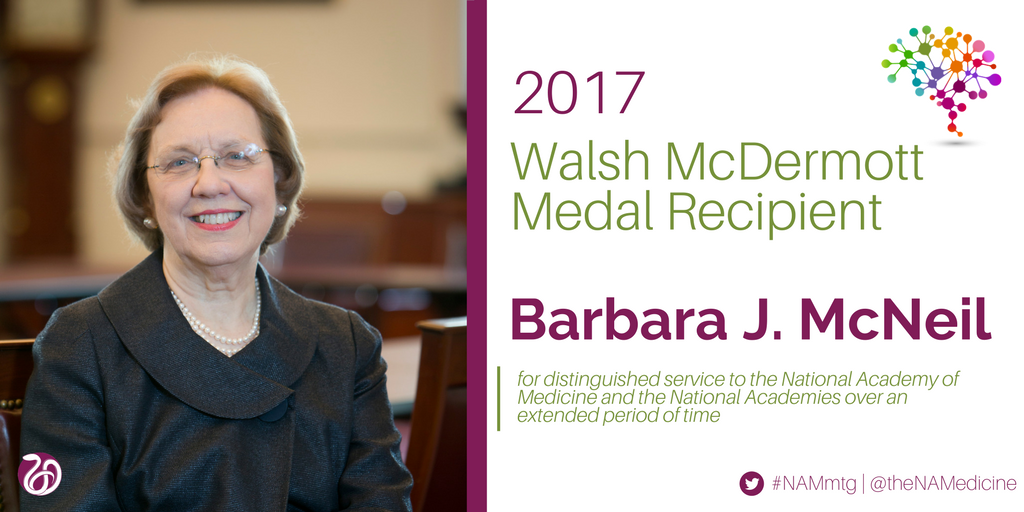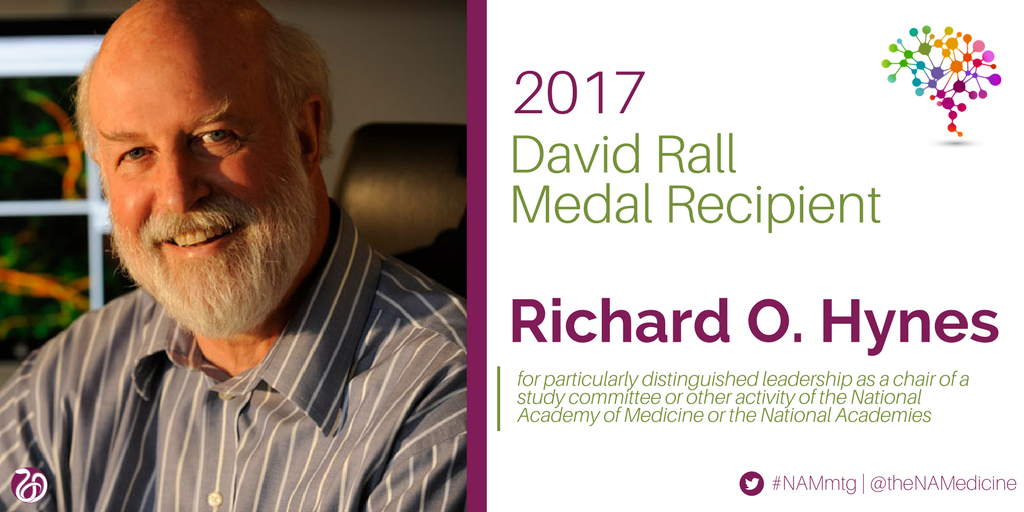[message_box title=”New! Read Our Interviews with the 2017 Member Award Recipients” color=”blue”]
- Barbara McNeil (Walsh McDermott Award)
- Richard Hynes (David Rall Award)
- Ruth Faden (Adam Yarmolinsky Award)
[/message_box]
The National Academy of Medicine (NAM) honored three members today at its annual meeting for their outstanding service. The honorees are Barbara J. McNeil, Ridley Watts Professor and founding head of the department of health care policy at Harvard Medical School and professor of radiology at Brigham and Women’s Hospital; Richard O. Hynes, investigator at the Howard Hughes Medical Institute and Daniel K. Ludwig Professor for Cancer Research in the Koch Institute for Integrative Cancer Research at the Massachusetts Institute of Technology; and Ruth R. Faden, Philip Franklin Wagley Professor of Biomedical Ethics and founder of the Berman Center for Bioethics at Johns Hopkins University.
“We are delighted to honor these extraordinary members who have demonstrated their endless dedication to improving health and furthering science,” said National Academy of Medicine President Victor J. Dzau. “Year after year, their service to the NAM and the National Academies in so many roles has been absolutely critical to our work addressing challenges in health and medicine.”
McNeil received the Walsh McDermott Medal, which is awarded to a member for distinguished service to the National Academies of Sciences, Engineering, and Medicine over an extended period. Educated in quantitative biochemical science and devoted to the study of new medical technologies, McNeil is an investigator in decision procedures and theory, technology assessment, and quality-of-care measurement, as well as a member of numerous government and foundation advisory groups. She has engaged in rigorous development and study of quality measures in health care and their implications for the organization, delivery, and cost of that care. McNeil’s contributions to the NAM are numerous and noteworthy, including serving on NAM’s Governing Council between 1991 and 1996 (including as vice chair from 1994 to 1996) and as a member of both the NAM Finance and Membership Committees. McNeil has also been involved with a variety of National Academies activities since the early 1980s, serving on the Nuclear and Radiation Studies Board, the former Commission on Behavioral and Social Sciences and Education, the Board of Health Sciences Policy and, for a decade, the Board of Health Care Services, which she also chaired from 2002 to 2006. Her committee service includes roles as chair, vice chair, and committee member across a range of reports that comprise an unusually broad representation of Academy interests. The reports of these study committees focused on topics such as nuclear and radiation studies, quality initiative coordination, evidence to identify highly effective clinical services, cancer care improvement, new approaches to early detection of breast cancer, future directions in behavioral and social sciences research, tracking radiation doses from medical diagnostic procedures, and airport passenger screening. To these activities, McNeil brought her deep analytical talents, her incisive thinking and decision-making, along with a strong sense of collegiality. Read our interview with Dr. McNeil >>
Hynes was awarded the David Rall Medal, which is given to a member who has demonstrated particularly distinguished leadership as chair of a study committee or other National Academies activities, showing commitment above and beyond the usual responsibilities of the position. A unifying force and an eminent presence at the National Academies since the mid-1990s, Hynes co-chaired high-profile committees on two politically sensitive topics — embryonic stem cell research and human genome editing — which produced seminal reports that have, or are poised to, shape the parameters of public debate and the policies and regulation of these fields. From 2004 to 2005, he co-chaired the Committee on Guidelines for Human Embryonic Stem Cell Research. At the time, embryonic stem cell research was at the center of a political firestorm, caught in the web of the highly polarizing abortion debate and the conflation of embryonic stem cell research and cloning. Through his patience, open-mindedness, and cheerful willingness, Hynes familiarized himself and the committee with the relevant ethical, legal, and social issues. His quiet but firm leadership style made all the difference in the committee’s ability to produce a consensus set of guidelines, which became the model for guidelines written by the International Society for Stem Cell Research. More recently, from 2015 to 2017, he co-chaired the Committee on Human Gene Editing: Scientific, Medical, and Ethical Considerations, which dealt with two highly contentious topics — human enhancement and heritable germline genetic modification — both with long histories of public debate in academic literature. Hynes deftly managed a committee of passionate experts whose analyses were heavily influenced by their own larger views about human nature, the nature of civil society, and the interplay between morality and public policy. He worked successfully to incorporate not just factual information but also the divergent assessments and characterizations of the state of the science within the committee into a set of coherent consensus recommendations. Hynes accepted an extraordinary amount of personal responsibility in co-chairing this committee, and the resulting report is a testament to his commitment to excellence and his abilities. Together, with his co-chair, they masterfully shepherded the report through divisive political waters within the committee and among diverse stakeholders following the report’s release. Read our interview with Dr. Hynes >>
Faden received the Adam Yarmolinsky Medal, which is awarded to a member from a discipline outside the health and medical sciences who has contributed to the mission of the NAM over a significant period. Faden is an outstanding scholar, teacher, and citizen, whose contributions to the National Academy of Medicine and the National Academies have been extensive and significant. Throughout her career, Faden has changed the role of bioethics in health and medicine by emphasizing the role of public health ethics, tackling novel questions in research ethics, and exploring foundational issues in social justice. She has shared her expertise as a member of many National Academies committees since the late 1980s. For example, from 1992 to 1993, she chaired the Committee on Legal and Ethical Issues Relating to the Inclusion of Women in Clinical Studies, whose report outlined guiding principles about justice in research, especially in the context of gender bias and human research. Based on these guiding principles, the report explained why and when health questions should be examined separately for women and men, promoted strategies to recruit more women and minority populations in clinical research, and recommended that women of reproductive age not be excluded from clinical studies by default and in the absence of proper risk-benefit analysis. From 2010 to 2012, Faden also co-chaired the Committee on Ethical and Scientific Issues in Studying the Safety of Approved Drugs, which recommended changes to how the Food and Drug Administration approaches post-marketing drug studies, when to require randomized trials, and different types of oversight to better protect citizens from drug safety failures. Faden has also participated in other important National Academies bodies, including the Board on Health Sciences Policy and the NAM Membership Committee. She has worked to advance social justice through a number of National Academies forums and meetings and authored commissioned papers for the National Academies on when and why racial and ethnic disparities matter and on ethical and legal issues in a pandemic response. In her work for the National Academies and Johns Hopkins University, Faden continues to set the agenda for emerging issues in bioethics and to prepare the next generation of scholars. Read our interview with Dr. Faden >>




